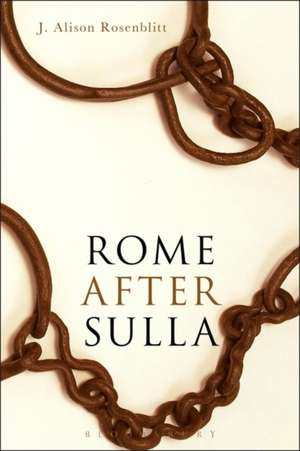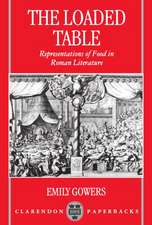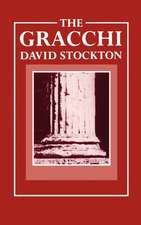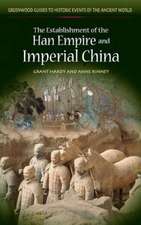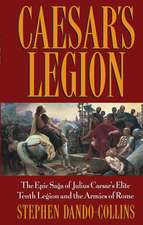Rome after Sulla
Autor J. Alison Rosenblitten Limba Engleză Paperback – 22 iul 2020
| Toate formatele și edițiile | Preț | Express |
|---|---|---|
| Paperback (1) | 223.93 lei 43-57 zile | |
| Bloomsbury Publishing – 22 iul 2020 | 223.93 lei 43-57 zile | |
| Hardback (1) | 655.26 lei 43-57 zile | |
| Bloomsbury Publishing – 23 ian 2019 | 655.26 lei 43-57 zile |
Preț: 223.93 lei
Preț vechi: 288.46 lei
-22% Nou
Puncte Express: 336
Preț estimativ în valută:
42.85€ • 44.86$ • 35.45£
42.85€ • 44.86$ • 35.45£
Carte tipărită la comandă
Livrare economică 07-21 aprilie
Preluare comenzi: 021 569.72.76
Specificații
ISBN-13: 9781472580580
ISBN-10: 1472580583
Pagini: 240
Ilustrații: 6 bw illus
Dimensiuni: 156 x 234 x 17 mm
Greutate: 0.33 kg
Editura: Bloomsbury Publishing
Colecția Bloomsbury Academic
Locul publicării:London, United Kingdom
ISBN-10: 1472580583
Pagini: 240
Ilustrații: 6 bw illus
Dimensiuni: 156 x 234 x 17 mm
Greutate: 0.33 kg
Editura: Bloomsbury Publishing
Colecția Bloomsbury Academic
Locul publicării:London, United Kingdom
Caracteristici
Engages with a wide spectrum of approaches to Roman history from prosopography and political reconstruction to literary theory
Notă biografică
J. Alison Rosenblitt is Senior College Lecturer in Ancient History at Regent's Park College, University of Oxford, UK. Rome after Sulla is her second book. Her first book, E.E. Cummings' Modernism and the Classics: Each Imperishable Stanza (2016) won a 2018 CAMWS First Book Award.
Cuprins
AcknowledgementsIllustrationsPreface1. Introduction: Sullan tyranny and Sullan instabilityOne: Negotiating the end of Sulla2. 80 BC: the pro Roscio vanishes3. 79 BC: the turning tideTwo: Counter-Revolution4. Urban conflict and Etrurian tumult: formulating 78-77 BC5. More than Catiline, less than Caesar: the politics of M. Aemilius Lepidus, cos. 78 BC6. After Sulla; after LepidusThree: Sallust and the political culture of Rome after Sulla7. Autocracy and stability: moving beyond the 'problems' of the speech of Lepidus8. Dominatio and deceit: Sallust on Pompey9. Hostile Politics (I): political discourse after Sulla10. Hostile Politics (II): Sallust's HistoriaeEpilogue: Legitimacy and the end of the republicAppendix A: Evidence for the activities of M. Aemilius Lepidus, cos. 78 BCAppendix B: 'Problems' in Sallust's speech of LepidusWorks citedIndex
Recenzii
The book is well written and argued, and will surely be of interest to anyone interested in the late Republic.
This volume makes an important contribution to the study of several pivotal late republican texts, and Rosenblitt's success in re-centring Sallust and the years 80-77 in reconstructions of Sulla's legacy is welcome.
A thought-provoking voice in the discussion over the period of the 80's and the 70's of the first century BCE, and an interesting interpretation of Sallustius' Historiae, which is of major importance to the historical times discussed.
Rosenblitt's book is a useful contribution to reflection and debate on the conditions of political life at the end of the Roman Republic.
[Rosenblitt] is surely right to emphasize importance of the "Sullan watershed" (122) in Republican history, and has presented a strong and well-argued case for this view ... [A] fine, instructive and important study.
[The book's] considerations provide important [thought] for current research debates on the periodization of the RomanRepublic or the social impact of the republican civil wars.
This volume makes an important contribution to the study of several pivotal late republican texts, and Rosenblitt's success in re-centring Sallust and the years 80-77 in reconstructions of Sulla's legacy is welcome.
A thought-provoking voice in the discussion over the period of the 80's and the 70's of the first century BCE, and an interesting interpretation of Sallustius' Historiae, which is of major importance to the historical times discussed.
Rosenblitt's book is a useful contribution to reflection and debate on the conditions of political life at the end of the Roman Republic.
[Rosenblitt] is surely right to emphasize importance of the "Sullan watershed" (122) in Republican history, and has presented a strong and well-argued case for this view ... [A] fine, instructive and important study.
[The book's] considerations provide important [thought] for current research debates on the periodization of the RomanRepublic or the social impact of the republican civil wars.
